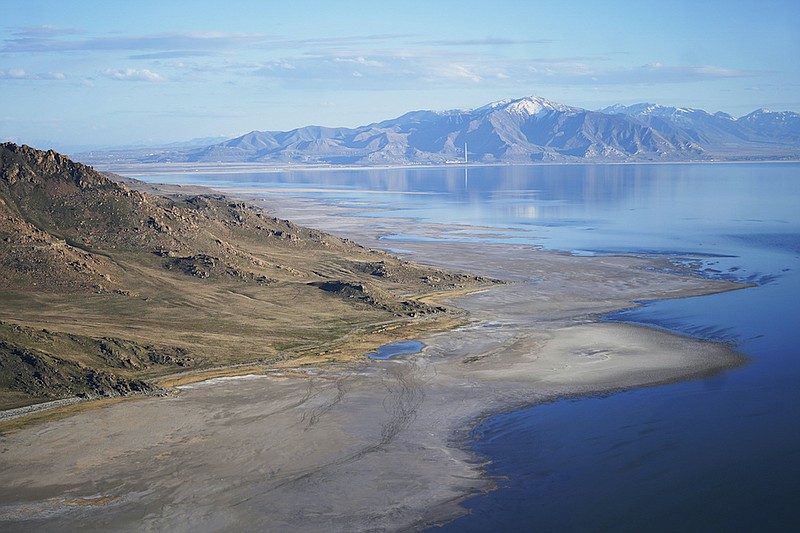The signals aren't subtle. Just this year, the west has had historic heat and wildfire - after previous historic years of heat and wildfire. We've watched devastating storms, drought that's shrinking major reservoirs, an ice storm that crippled the entire state of Texas.
We're seeing unprecedented floods in Europe, rising seas and tides undermining Florida streets and buildings, crops too thirsty and hot to grow, record-low Arctic ice levels.
It will only get worse. According to NASA, the Arctic Ocean is expected to become essentially ice-free in summer before mid-century - just 29 years from now. Already, on average, Arctic sea ice has been declining at a rate of 13.1% per decade since about 1980.
As for U.S. coastlines, we can expect "dramatic" increases in flooding by the mid-2030s, exacerbated by the moon's natural "wobbling" in 18.6-year cycles. NASA says this "flip" in the moon cycle will combine with rising seas from climate change to make flooding become widespread "for almost all coastal communities in the country" by 2035 - just 14 years away. See Key West while you still can.
With all this as a background, Senate Democrats last week outlined a far-reaching set of climate measures, and this $3.5 trillion budget deal must, must, must become a priority now. Finally.
The plan underscores how cutting U.S. greenhouse gas emissions - and spurring other nations to do the same - has emerged as a central priority for President Joe Biden and his party (along with voting rights) after years of relative indifference from lawmakers in Washington who were content to just snicker along with the likes of Sen. James Inhofe, R-Okla. It was Inhofe who in February 2015 brought a snowball to the Senate floor to "prove" there was no global warming.
Don't tell that to Sen. Brian Schatz, D-Hawaii.
"We are facing a planetary crisis, not in the future or somewhere far away, but in every community across the country," said Schatz, who along with several other Senate Democrats has said he won't support more traditional infrastructure spending without a separate bill that includes meaningful climate action. "So what we do has to be bold enough to meet the moment," he told The Washington Post.
By packing the climate provisions into the budget measure, Senate Majority Leader Charles E. Schumer, D-N.Y., hopes to avoid a Republican filibuster and pass the bill through budget reconciliation, which requires a simple majority of 51 votes. But Democrats hold the narrowest of margins in the Senate, and Schumer will likely need to rally the support of every member of his caucus to pass the legislation.
That's a tight fit, as Sen. Joe Manchin III, D-W.Va., has expressed skepticism over the push to rapidly phase out fossil fuels. Fossil fuels that are the primary driver of climate change. And make no mistake, this package, by definition, takes aim at the greenhouse gas emissions causing climate change. The policies within it offer the best chance of ratcheting down pollution and meeting Biden's goal of cutting U.S. greenhouse gas emissions by at least half by 2030, compared to 2005 levels.
Schumer and other Democrats put these policies together to reach that goal and nudge other countries to make similar cuts. Under the plan, the U.S. would impose a tax - a tariff, if you will - on nations lagging in reducing their own pollution. It also would place a fee on emissions of methane, a greenhouse gas more potent than carbon dioxide in the short term.
In the U.S., the plan would set new requirements - clean electricity standards - on power providers, pushing them toward wind, solar, hydroelectric, nuclear and other cleaner ways to generate energy. The goal is to have 80% clean electricity by the end of this decade.
The package would also offer tax breaks for buying electric vehicles and producing clean energy. And it would create a Civilian Climate Corps, modeled after Franklin D. Roosevelt's New Deal-era Civilian Conservation Corps. The new CCC would enlist young Americans in planting trees, hardening coastlines and readying the country for changing climate conditions.
The Post writes: "The details of the budgetary package will be fleshed out in the coming months, and it remains an open question as to whether the cuts in emissions that would result - both here and abroad - would be enough to help meet the goals of the Paris climate agreement, which calls for keeping warming 'well below' 2 degrees Celsius [a 3.6 degree increase in Fahrenheit], compared to preindustrial levels."
The clock is ticking. Both toward the midterm election year when the Democrats may lose their majority and toward that less-than-a-decade-away tipping point for more dangerous climate change.
Go big or go home, Senate. We cannot let our country and our world burn up. Don't let politics get in the way. Again.
